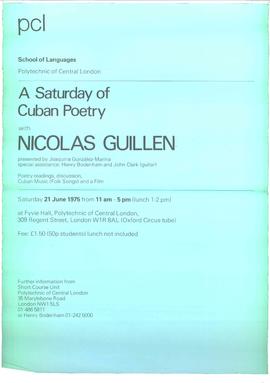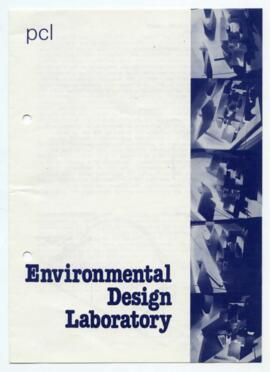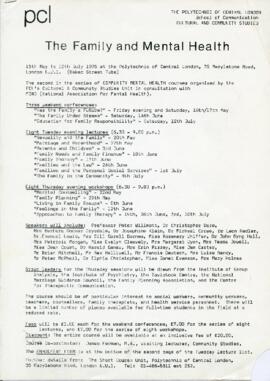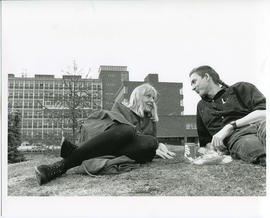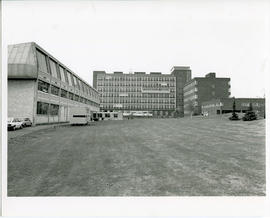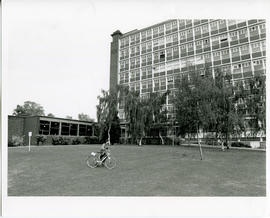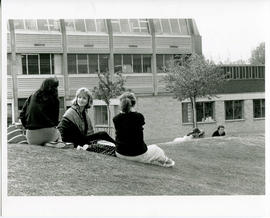Identity area
Reference code
Title
Date(s)
- 1970-1992 (Creation)
Level of description
Extent and medium
Context area
Name of creator
Administrative history
The Polytechnic of Central London (PCL) was designated on 1 May 1970 as a result of the White Paper, 'A Plan for Polytechnics and Other Colleges' (Cmd 3006), published in 1966. This outlined the arrangements for implementing the government's policy for a dual system of higher education, divided by the binary line, first outlined by Anthony Crosland, Secretary of State for Education, in a speech at Woolwich Polytechnic in 1965. The polytechnics in the public sector would provide vocational, professional and industrially-based courses, some for degrees awarded by the Council of National Academic Awards (CNAA), some at sub-degree level, and some to provide a second chance for those who had missed the opportunity for further education on leaving school.
PCL was the result of a merger of Regent Street Polytechnic with Holborn College of Law, Languages and Commerce. The new institution was structured as a limited company, incorporated on 22 April 1970. The memorandum and articles of association (1970) defined the responsibilities and constitutional framework, including the powers of the Court of Governors and of the Academic Council. London polytechnics continued to be funded and to an extent managed by the Inner London Education Authority (ILEA). Degrees were awarded by the Council for National Academic Awards (CNAA) which both validated new courses and carried out a more general quinquennial review of institutions.
By 1970 the plan to turn Regent Street into a tri-partite federal college, first announced by the LCC in 1960, was finally implemented when the buildings on the two new sites at Marylebone Road and New Cavendish Street were finished. At a ceremony on 21 May 1971, Lord Hailsham, Lord Chancellor and grandson and namesake of the founder Quintin Hogg, combined opening the new buildings with the formal presentation of the Instrument of designation to PCL. Marylebone Road housed architecture, building, civil engineering, surveying and town planning, together with a separate block for management studies; electrical and electronic engineering, life sciences, mathematics and physics, and mechanical engineering moved to New Cavendish Street. In the early 1970s the extension building between Riding House Street and Little Titchfield Street was refurbished for the School of Communication, and Languages moved to a newly acquired building in Euston Centre in 1978. The Sidney Webb College of Education was amalgamated with PCL in 1975 and closed in 1980. In 1990 Harrow College of Higher Education merged with PCL.
Between 1970 and 1988 PCL expanded and developed to provide industrial, commercial, professional and scientific education, training and research for students at all levels of higher and technical education. By 1988 there were roughly 5,000 students on full-time and sandwich courses, the majority of whom were following CNAA degree and post-graduate courses; 6,000 students followed part-time and evening courses. PCL ran Europe's largest programme of short courses, with 17,000 people every year engaged in mid-career and personal development. Among a number of innovations was the development of one-year foundation programmes leading to degrees in engineering and science, which were subsequently adopted nationwide as a way of widening participation. Research activity increased. In 1988, PCL was awarded a total value of £3.2 million in external research awards (compared with £30,000 in 1970), although it was excluded from applying for the public research funding available to universities.
The Education Reform Act of 1988 removed polytechnics from the control of local authorities and transferred their funding to a new body, the Polytechnics and Colleges Funding Council (PCFC), which was itself replaced in 1992 when the Higher and Further Education Act created a single Higher Education Funding Council, abolishing the binary line by removing any remaining distinctions between polytechnics and universities. PCL became the University of Westminster in 1992.
In 1988 PCL celebrated the 150th anniversary of its predecessor, the Royal Polytechnic Institution, with a programme of special events. The Polytechnic Institute, representing the sports and social clubs characteristic of Regent Street Polytechnic, continued to function during this period, though its activities declined considerably as pressure for educational use in the buildings increased.
Repository
Archival history
Immediate source of acquisition or transfer
Content and structure area
Scope and content
Appraisal, destruction and scheduling
Accruals
System of arrangement
This Fonds is currently being catalogued. Newly catalogued material will be added on a regular basis. Please contact the Archivist for more information.
The Fonds has been sub-divided into the following sections:
PCL/1 Governing Body and Committees
PCL/2 Administrative records
PCL/3 Financial records
PCL/4 Education records
PCL/5 Publications
PCL/6 Events
PCL/7 Photographs
PCL/8 Students' Union
Conditions of access and use area
Conditions governing access
Status: Partially restricted – please contact University Records and Archives for more information.


